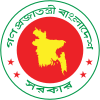It has been suggested that this article be merged into Secondary School Certificate . (Discuss) Proposed since February 2025. |
| Acronym | SSC |
|---|---|
| Type | Public Examination |
| Administrator | Directorate of Secondary and Higher Education |
| Purpose | To assess students' knowledge at the secondary education level. |
| Year started | 1953 |
| Score range | 0-100 marks per subject |
| Offered | Bangladesh |
| Regions | Nationwide (Various Education Boards) |
| Languages | Bengali, English |
| Prerequisites | Completion of Junior School Certificate |
| Website | https://www.dshe.gov.bd |
The Secondary School Certificate (SSC) is a public examination in Bangladesh taken by students in the 10th grade. It is a significant milestone in the country's education system and marks the completion of secondary education. [1]
